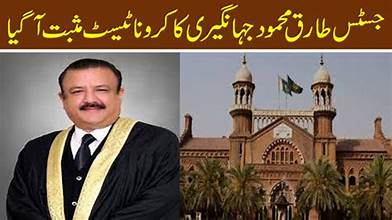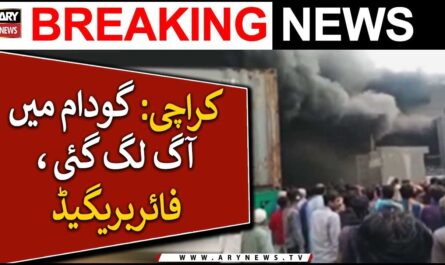The Islamabad High Court (IHC) has issued a significant order barring Justice Tariq Mehmood Jahangiri from performing judicial duties. This development has stirred conversations within legal, political, and civil society circles across Pakistan. The judiciary, often seen as the guardian of constitutional rights and the rule of law, is once again at the center of public debate. The decision reflects the delicate balance between judicial accountability and independence, both of which are vital for a functioning democracy.
Background of the Case
Justice Tariq Mehmood Jahangiri, a sitting judge of the IHC, has been a prominent figure in Pakistan’s legal landscape. Known for presiding over several high-profile cases, his role has been influential in shaping key judicial outcomes. However, recent controversies and inquiries into his conduct have raised serious questions.
Petitions were filed, alleging procedural irregularities and raising concerns about judicial impartiality. The matter eventually landed before the Supreme Judicial Council (SJC), the constitutional body responsible for overseeing the accountability of judges. Pending the outcome of inquiries, the IHC issued a directive temporarily barring Justice Jahangiri from judicial work.
This move is not unprecedented, as Pakistan’s judicial history has seen instances where judges have been sidelined while inquiries are conducted. Nevertheless, the case highlights the ongoing struggle to ensure that the judiciary remains both independent and accountable.
Reasons Behind the IHC Directive
The IHC’s decision to stop Justice Jahangiri from performing judicial duties stems from several contributing factors:
- Allegations of Misconduct
Reports suggest that allegations of misconduct had been brought against him, requiring investigation before allowing him to continue presiding over cases. - Ensuring Judicial Integrity
The judiciary holds immense responsibility in upholding constitutional rights. To prevent any perception of bias or misuse of authority, the IHC acted preemptively. - Pending Proceedings in the Supreme Judicial Council
With the SJC reviewing complaints against Justice Jahangiri, the IHC decided that stepping aside from active judicial work was necessary until the matter concludes. - Maintaining Public Confidence
Any controversy involving judges risks undermining public trust in the judiciary. Temporarily barring him aims to preserve the institution’s credibility.
Reaction from Legal Circles
The order has generated a mix of responses:
- Support for the Decision
Legal experts supportive of the directive argue that accountability within the judiciary is non-negotiable. They believe the step is essential for protecting the sanctity of the courts. - Concerns About Judicial Independence
On the other hand, some lawyers and commentators worry that such actions, if perceived as politically motivated, could weaken judicial independence. They emphasize the importance of due process. - Civil Society Perspectives
Rights activists largely view the decision as a positive move toward transparency. For them, no individual, including judges, should be beyond scrutiny.

Impact on the Judiciary
The judiciary in Pakistan is a cornerstone of governance. Cases related to human rights, constitutional interpretation, and executive overreach often rest with the higher courts. The sidelining of Justice Jahangiri has both immediate and long-term implications:
- Case Backlogs
The IHC is already burdened with a heavy caseload. With one judge barred from work, delays in hearings and judgments are expected. - Institutional Credibility
By taking swift action, the court signals that accountability applies equally to all. This strengthens institutional credibility in the long run. - Pressure on Remaining Judges
Other judges may feel additional pressure, balancing their workload while also maintaining high standards of conduct.
IHC Bars Justice Tariq Mehmood Jahangiri from Performing Judicial Duties
Broader Implications for Judicial Accountability
This case is part of a larger debate on judicial accountability in Pakistan. Historically, the judiciary has oscillated between being a bulwark of constitutionalism and facing criticism for internal weaknesses.
- Role of the Supreme Judicial Council
The SJC plays a crucial role in ensuring that judges are held accountable. However, critics argue that its proceedings are often slow and lack transparency. - Balance Between Independence and Oversight
While independence is necessary for judges to rule without fear or favor, oversight mechanisms are equally important to prevent abuse of authority. - Public Perception of Justice
For ordinary citizens, cases like this shape their view of whether the judiciary is fair, impartial, and free of corruption.
Political Dimensions
Given Pakistan’s history, judicial proceedings often carry political undertones. Some observers suggest that such decisions could be linked to broader political pressures, while others insist that this is purely a matter of institutional accountability.
It is important to note that politicization of judicial matters can erode faith in both governance and the rule of law. To avoid such perceptions, transparency in the inquiry against Justice Jahangiri will be essential.

What Lies Ahead?
The future course of this matter depends heavily on the Supreme Judicial Council’s findings. Possible outcomes include:
- Exoneration
If cleared of allegations, Justice Jahangiri could be reinstated, restoring his role and credibility. - Disciplinary Action
Should the SJC find evidence of misconduct, it could recommend removal or other disciplinary measures. - Institutional Reforms
The case might renew calls for reforms in judicial accountability mechanisms, ensuring quicker and more transparent proceedings in the future.
Public Interest and Everyday Impact
For the general public, this development may appear distant, but it has real consequences. Judicial decisions affect everything from property disputes and civil rights to government accountability. Ensuring that judges remain beyond reproach directly impacts the fairness of justice delivered to citizens.
Moreover, public confidence in courts is vital for maintaining law and order. If the judiciary is perceived as compromised, citizens may lose faith in the system, leading to instability and weakening democracy.
Conclusion
The Islamabad High Court’s directive barring Justice Tariq Mehmood Jahangiri from judicial duties marks a defining moment in Pakistan’s legal landscape. While the decision underscores the principle of accountability, it also raises crucial questions about balancing independence and oversight within the judiciary.
For Pakistan’s democratic system, this case is not just about one judge—it is about institutional integrity, transparency, and the rule of law. The final verdict of the Supreme Judicial Council will determine not only the future of Justice Jahangiri but also the credibility of judicial accountability mechanisms in the country.
In the meantime, the IHC’s action serves as a reminder that the judiciary, like any other pillar of the state, must remain subject to scrutiny in the interest of justice and public trust.



